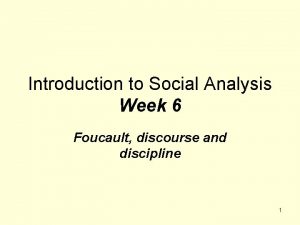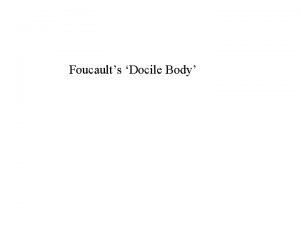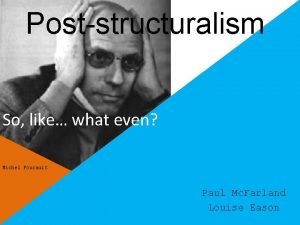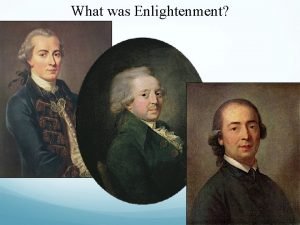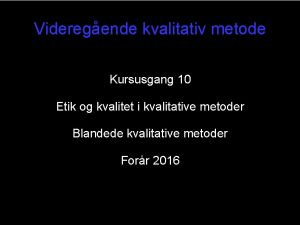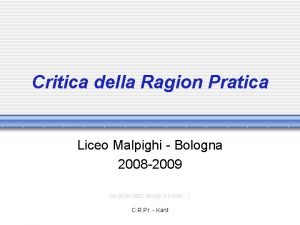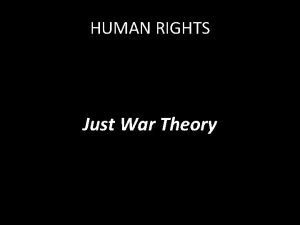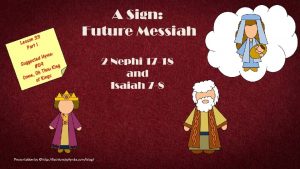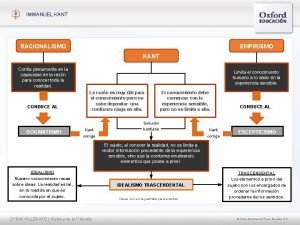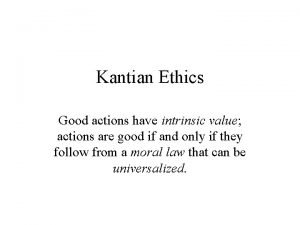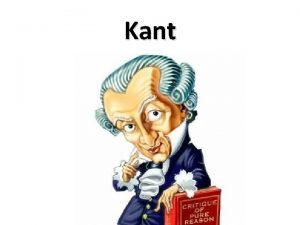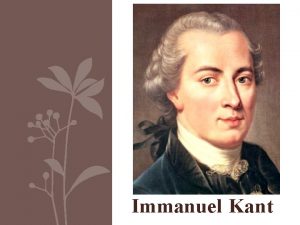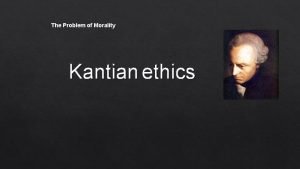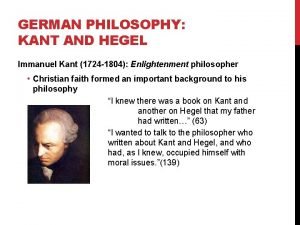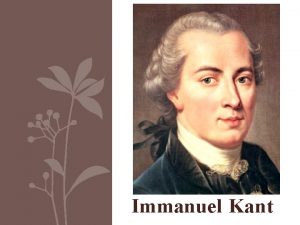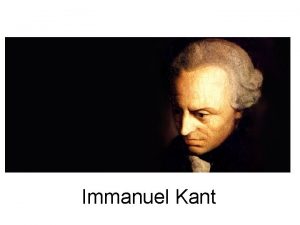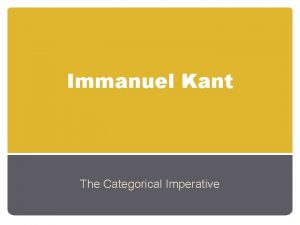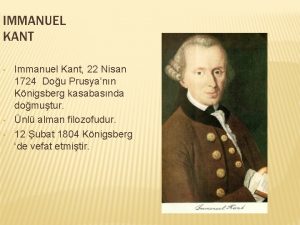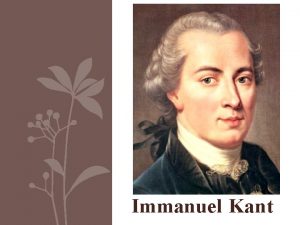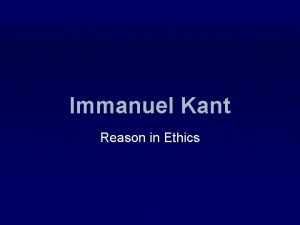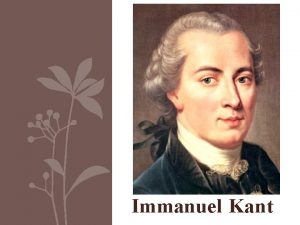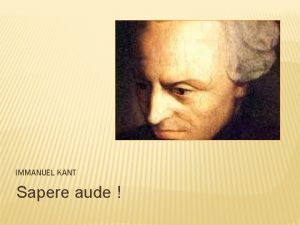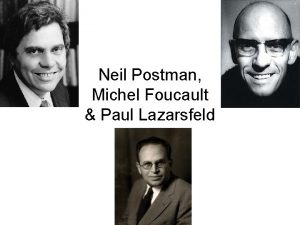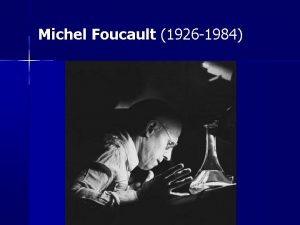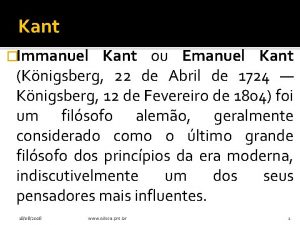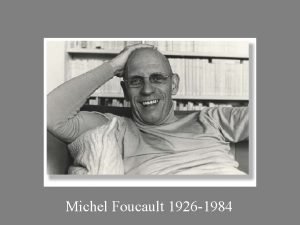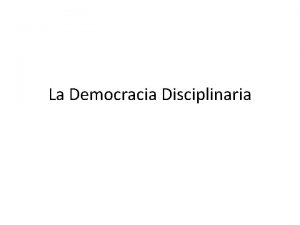Immanuel Kant Michel Foucault What is Enlightenment Shanghai
























- Slides: 24

Immanuel Kant Michel Foucault ‘What is Enlightenment? ’

Shanghai: Pudong skyline, from the Bund

‘Primitive people, Santa Cruz, Solomon Islands, Melanesia, Oceania’

Shanty in Port-au-Prince, Haiti

Who are Haiti’s poor rural people and where are they? The poorest groups of rural people in Haiti are: • women who are heads of households • rural workers who depend exclusively on wage employment • landless farmers (sharecroppers) • fishers who do not have their own boats • charcoal producers with no other activity

Lia Perjovschi, ‘Modernity’

‘Moral sensibility and modernity’

‘Why pan-Islamism is the biggest roadblock for Muslims’ integration with modernity’ (Arshia Malik)

Modernisation/Modernism/Modernity

Modernization

Modernism (Wassily Kandinsky)

Marshall Berman, All That Is Solid Melts into Air To be modern is to find ourselves in an environment that promises us adventure, power, joy, growth, transformation of ourselves and the world – and at the same time that threatens to destroy everything we have, everything we know, everything we are.

Foucault, on Kant The hypothesis I should like to propose is that this little text is located in a sense at the crossroads of critical reflection and reflection on history. It is a reflection by Kant on the contemporary status of his own enterprise. No doubt it is not the first time that a philosopher has given his reasons for undertaking his work at a particular moment. But it seems to me that it is the first time that a philosopher has connected in this way, closely and from the inside, the significance of his work with respect to knowledge, a reflection on history and a particular analysis of the specific moment at which he is writing and because of which he is writing. It is in the reflection on ‘today’ as difference in history and as motive for a particular philosophical task that the novelty of this text appears to me to lie (p. 38).


Talking Heads, ‘Once in a Lifetime’ https: //www. youtube. com/watch? v=5 Is. Sp. AOD 6 K 8

Talking Heads, ‘Once in a Lifetime’ You may find yourself living in a shotgun shack You may find yourself in another part of the world You may find yourself behind the wheel of a large automobile You may find yourself in a beautiful house, with a beautiful wife You may ask yourself, well, how did I get here? Letting the days go by, let the water hold me down Letting the days go by, water flowing underground Into the blue again after the money's gone Once in a lifetime, water flowing underground You may ask yourself, how do I work this? You may ask yourself, where is that large automobile? You may tell yourself, this is not my beautiful house You may tell yourself, this is not my beautiful wife Letting the days go by, let the water hold me down Letting the days go by, water flowing underground Into the blue again, after the money's gone Once in a lifetime, water flowing underground Same as it ever was, same as it ever was, same as it ever was

Kant is the first philosopher to ‘take aim like an archer at the heart of a present that is concentrated in the significance of the contemporary moment, and thereby to inaugurate the philosophical discourse of modernity’. Jürgen Habermas

Political Map of Europe, late 18 th C

Political Map of Europe, today

Unmündigkeit • English translations: immaturity, nonage, minority, non compos mentis (‘not of sound mind’) • Opposite: Mündigkeit – majority, able to represent oneself, responsibility • Der Mund: mouth

William Blake, ‘London’ (1794) I wander thro' each charter'd street, Near where the charter'd Thames does flow. And mark in every face I meet Marks of weakness, marks of woe. In every cry of every Man, In every Infants cry of fear, In every voice: in every ban, The mind-forg'd manacles I hear How the Chimney-sweepers cry Every blackning Church appalls, And the hapless Soldiers sigh Runs in blood down Palace walls But most thro' midnight streets I hear How the youthful Harlots curse Blasts the new-born Infants tear And blights with plagues the Marriage hearse

Kant’s republicanism Kant advocates a kind of republicanism, in radical opposition to Thomas Hobbes’s famous postulate, ‘auctoritas non veritas facit legem’ (‘authority not truth makes law’).

Foucault, on Kant The hypothesis I should like to propose is that this little text is located in a sense at the crossroads of critical reflection and reflection on history. It is a reflection by Kant on the contemporary status of his own enterprise. No doubt it is not the first time that a philosopher has given his reasons for undertaking his work at a particular moment. But it seems to me that it is the first time that a philosopher has connected in this way, closely and from the inside, the significance of his work with respect to knowledge, a reflection on history and a particular analysis of the specific moment at which he is writing, and because of which he is writing. It is in the reflection on ‘today’ as difference in history and as motive for a particular philosophical task that the novelty of this text appears to me to lie. And, by looking at it in this way, it seems to me we may recognize a point of departure: the outline of what one might call the attitude of modernity’ (Foucault, p. 38).

Foucault on modernity I wonder whether we may not envisage modernity rather as an attitude than as a period of history. And by ‘attitude, ’ I mean a mode of relating to contemporary reality; a voluntary choice made by certain people; in the end, a way of thinking and feeling; a way, too, of acting and behaving that at one and the same time marks a relation of belonging and presents itself as a task. A bit, no doubt, like what the Greeks called an ethos. And consequently, rather than seeking to distinguish the ‘modern era’ from the ‘premodern’ or ‘postmodern, ’ I think it would be more useful to try to find out how the attitude of modernity, ever since its formation, has found itself struggling with attitudes of ‘countermodernity’ (p. 38). Modernity is often characterized in terms of consciousness of the discontinuity of time: a break with tradition, a feeling of novelty, of vertigo in the face of the passing moment (p. 39) Modernity is the attitude that makes it possible to grasp the ‘heroic’ aspect of the present moment. Modernity is not a phenomenon of sensitivity to the fleeting present; it is the will to ‘heroize’ the present (p. 40).
 Michel foucault magt
Michel foucault magt Michel foucault critical theory
Michel foucault critical theory Discontinuidad
Discontinuidad Michel foucault
Michel foucault Michel foucault summary
Michel foucault summary Docile bodies explained
Docile bodies explained Michel foucault
Michel foucault Michel foucault what is an author
Michel foucault what is an author Ejemplos de doxa y episteme
Ejemplos de doxa y episteme Post structuralism michel foucault
Post structuralism michel foucault Immanuel kant 1724 1804
Immanuel kant 1724 1804 Immanuel kant pligtetik
Immanuel kant pligtetik What does sapere aude mean
What does sapere aude mean Liceo immanuel kant
Liceo immanuel kant Juicio sintetico a priori
Juicio sintetico a priori Immanuel kant human rights
Immanuel kant human rights Isaiah cried behold a virgin lyrics
Isaiah cried behold a virgin lyrics Immanuel kant racionalismo y empirismo
Immanuel kant racionalismo y empirismo Example of kantianism
Example of kantianism Diferencias entre el racionalismo y el empirismo.
Diferencias entre el racionalismo y el empirismo. Immanuel kant human rights
Immanuel kant human rights Kant first categorical imperative
Kant first categorical imperative Prima facie velvollisuudet
Prima facie velvollisuudet Hegel sunglasses
Hegel sunglasses Immanuel kant gesamtschule
Immanuel kant gesamtschule

